Burt A. The Evolution of the British Empire and Commonwealth From the American Revolution
Подождите немного. Документ загружается.

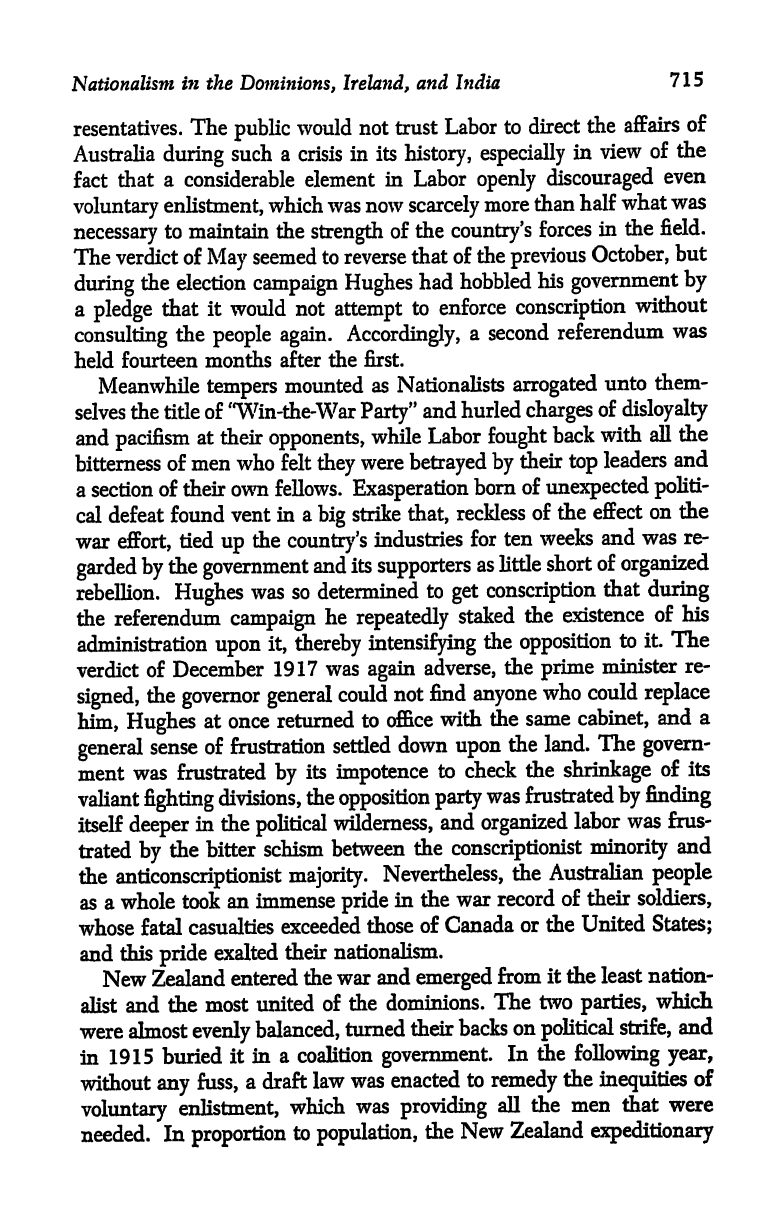
Nationalism
in the
Dominions,
Ireland,
and
India
715
resentatives.
The
public
would
not
trust
Labor
to direct
the
affairs
of
Australia
during
such
a
crisis
in its
history,
especially
in
view
of
the
fact
that
a
considerable element
in Labor
openly
discouraged
even
voluntary
enlistment,
which
was now
scarcely
more
than
half
what
was
necessary
to
maintain
the
strength
of
the
country's
forces
in
the
field.
The
verdict of
May
seemed to
reverse
that of
the
previous
October,
but
during
the election
campaign
Hughes
had
hobbled
his
government
by
a
pledge
that
it would not
attempt
to
enforce
conscription
without
consulting
the
people
again.
Accordingly,
a
second
referendum
was
held
fourteen months
after
the
first.
Meanwhile
tempers
mounted
as
Nationalists
arrogated
unto
them-
selves
the
tide
of
"Win-the-War
Party"
and
hurled
charges
of
disloyalty
and
pacifism
at
their
opponents,
while
Labor
fought
back
with
all the
bitterness
of
men who
felt
they
were
betrayed
by
their
top
leaders
and
a section
of
their own
fellows.
Exasperation
born
of
unexpected
politi-
cal
defeat
found
vent in
a
big
strike
that,
reckless
of
the
effect
on
the
war
effort,
tied
up
the
country's
industries
for
ten
weeks
and
was
re-
garded
by
the
government
and
its
supporters
as little
short
of
organized
rebellion.
Hughes
was so determined
to
get
conscription
that
during
the
referendum
campaign
he
repeatedly
staked
the
existence
of
his
administration
upon
it,
thereby
intensifying
the
opposition
to
it.
The
verdict
of
December
1917
was
again
adverse,
the
prime
minister
re-
signed,
the
governor
general
could
not
find
anyone
who
could
replace
him,
Hughes
at once
returned
to
office
with
die
same
cabinet,
and
a
general
sense
of
frustration
setded
down
upon
the land.
The
govern-
ment
was frustrated
by
its
impotence
to
check
the
shrinkage
of
its
valiant
fighting
divisions,
the
opposition
party
was frustrated
by finding
itself
deeper
in the
political
wilderness,
and
organized
labor
was
frus-
trated
by
the
bitter
schism between
the
conscriptionist
minority
and
the
anticonscriptionist
majority.
Nevertheless,
the
Australian
people
as
a
whole
took
an immense
pride
in the
war
record
of
their
soldiers,
whose
fatal
casualties
exceeded
those
of Canada
or the
United
States;
and
this
pride
exalted
their
nationalism.
New
Zealand
entered
the
war and
emerged
from
it the
least
nation-
alist
and
the
most
united
of
the
dominions.
The
two
parties,
which
were
almost
evenly
balanced,
turned
their backs
on
political
strife,
and
in
1915
buried
it
in
a coalition
government.
In
the
following
year,
without
any
fuss,
a draft
law
was
enacted
to
remedy
die
inequities
of
voluntary
enlistment,
which
was
providing
all
the
men that were
needed.
In
proportion
to
population,
the
New
Zealand
expeditionary
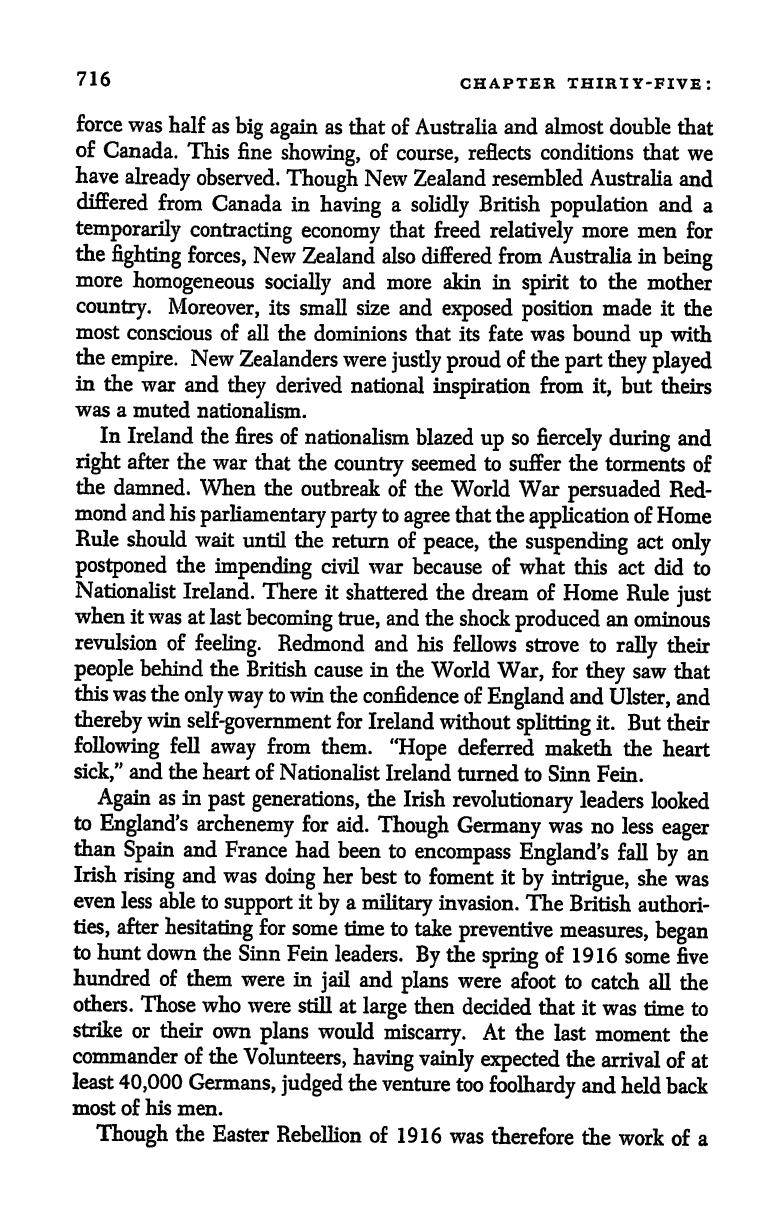
716
CHAPTER
THIRTY-FIVE:
force
was
half
as
big
again
as that
of
Australia
and
almost
double
that
of
Canada.
This
fine
showing,
of
course,
reflects conditions
that
we
have
already
observed.
Though
New Zealand
resembled Australia
and
differed
from
Canada
in
having
a
solidly
British
population
and
a
temporarily
contracting
economy
that freed
relatively
more
men
for
the
fighting
forces,
New
Zealand also
differed
from Australia in
being
more
homogeneous
socially
and
more akin in
spirit
to
the
mother
country.
Moreover,
its
small size
and
exposed
position
made
it
the
most
conscious
of all
the dominions
that its
fate was bound
up
with
the
empire.
New
Zealanders
were
justly
proud
of
the
part
they
played
in
the
war
and
they
derived
national
inspiration
from
it,
but
theirs
was a
muted
nationalism.
In
Ireland
the
fires
of
nationalism
blazed
up
so
fiercely
during
and
right
after the
war
that
the
country
seemed
to suffer
the
torments
of
the
damned.
When
the
outbreak
of the
World
War
persuaded
Red-
mond
and his
parliamentary
party
to
agree
that the
application
of
Home
Rule
should wait
until the
return of
peace,
the
suspending
act
only
postponed
the
impending
civil
war
because
of what
this
act
did
to
Nationalist
Ireland. There it
shattered
the
dream
of
Home
Rule
just
when
it
was
at
last
becoming
true,
and
the
shock
produced
an
ominous
revulsion of
feeling.
Redmond and his
fellows strove
to
rally
their
people
behind
the
British
cause in
the
World
War,
for
they
saw
that
this
was
the
only
way
to win
the
confidence of
England
and
Ulster,
and
thereby
win
self-government
for
Ireland
without
splitting
it.
But
their
following
fell
away
from
them.
"Hope
deferred
maketh
the
heart
sick,"
and
the
heart of
Nationalist
Ireland
turned
to Sinn
Fein.
Again
as in
past
generations,
the Irish
revolutionary
leaders
looked
to
England's
archenemy
for
aid.
Though
Germany
was
no
less
eager
than
Spain
and France
had been
to
encompass
England's
fall
by
an
Irish
rising
and
was
doing
her
best
to foment it
by
intrigue,
she
was
even
less
able
to
support
it
by
a
military
invasion.
The
British
authori-
ties,
after
hesitating
for some
time to
take
preventive
measures,
began
to
hunt down
the
Sinn
Fein
leaders.
By
the
spring
of
1916
some
five
hundred
of
them
were in
jail
and
plans
were
afoot
to
catch
all
the
others.
Those
who
were
still
at
large
then
decided that
it
was
time to
strike
or their
own
plans
would
miscarry.
At
the
last
moment
the
commander of the
Volunteers,
having
vainly
expected
the
arrival
of at
least
40,000
Germans,
judged
the
venture
too
foolhardy
and
held back
most
of
his
men.
Though
the
Easter
Rebellion of
1916
was
therefore
the
work
of
a
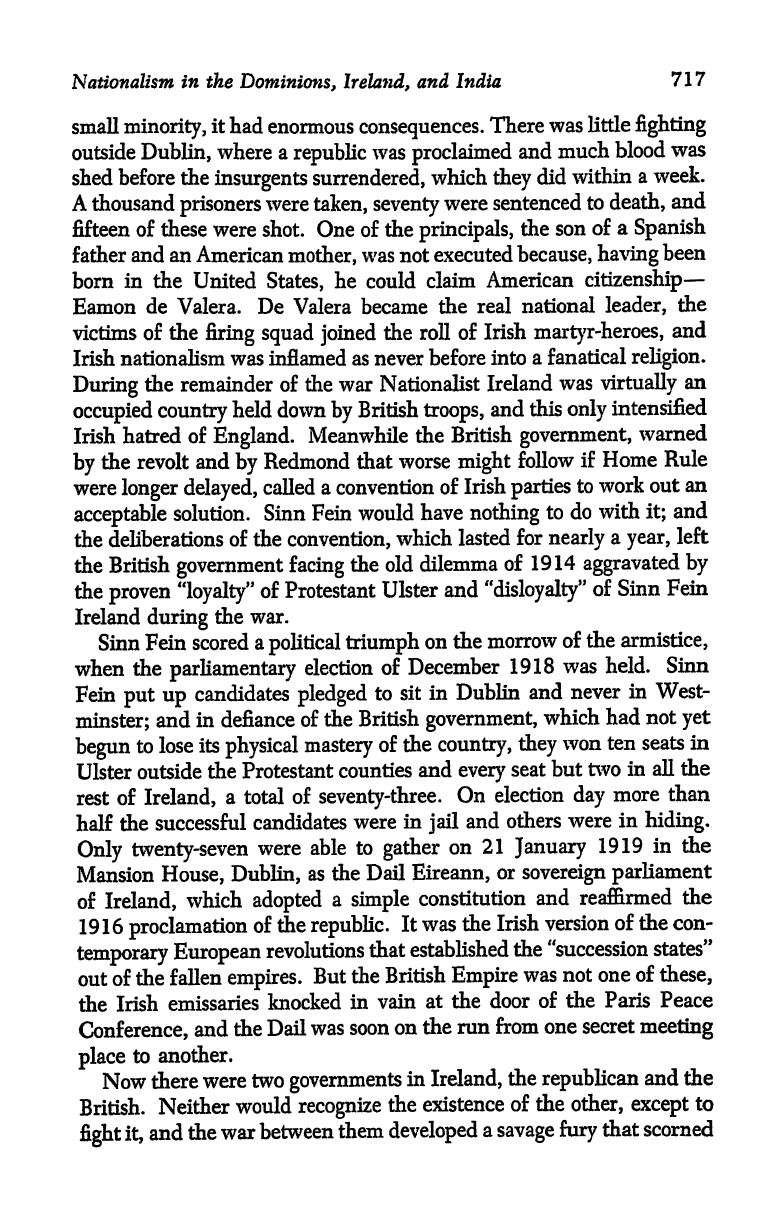
Nationalism
in
the
Dominions, Ireland,
and
India
717
small
minority,
it
had
enormous
consequences.
There
was little
fighting
outside
Dublin,
where
a
republic
was
proclaimed
and
much
blood
was
shed
before the
insurgents
surrendered,
which
they
did
within
a
week.
A
thousand
prisoners
were
taken,
seventy
were
sentenced
to
death,
and
fifteen
of these
were shot.
One of
the
principals,
the
son
of
a
Spanish
father
and an
American
mother,
was
not
executed
because,
having
been
born
in the
United
States,
he could
claim
American
citizenship
Eamon
de
Valera.
De
Valera became
the
real
national
leader,
the
victims
of
the
firing
squad
joined
the roll
of
Irish
martyr-heroes,
and
Irish
nationalism was inflamed as
never
before
into
a fanatical
religion.
During
the
remainder
of the war Nationalist
Ireland
was
virtually
an
occupied
country
held
down
by
British
troops,
and
this
only
intensified
Irish
hatred of
England.
Meanwhile
the
British
government,
warned
by
the revolt
and
by
Redmond
that
worse
might
follow
if
Home
Rule
were
longer
delayed,
called
a
convention
of
Irish
parties
to
work out
an
acceptable
solution.
Sinn Fein would
have
nothing
to do
with
it;
and
the deliberations
of the
convention,
which
lasted
for
nearly
a
year,
left
the British
government
facing
the old
dilemma
of
1914
aggravated
by
the
proven
"loyalty"
of
Protestant
Ulster
and
"disloyalty"
of
Sinn
Fein
Ireland
during
the
war.
Sinn
Fein
scored
a
political
triumph
on
the
morrow
of
the
armistice,
when
the
parliamentary
election
of
December
1918
was
held. Sinn
Fein
put
up
candidates
pledged
to
sit
in
Dublin
and
never
in
West-
minster;
and
in
defiance
of
the British
government,
which
had
not
yet
begun
to
lose
its
physical
mastery
of the
country,
they
won
ten
seats
in
Ulster
outside
the
Protestant
counties
and
every
seat but
two
in all
the
rest
of
Ireland,
a total
of
seventy-three.
On
election
day
more
than
half the
successful
candidates
were
in
jail
and
others
were
in
hiding.
Only
twenty-seven
were
able to
gather
on
21
January
1919
in the
Mansion
House,
Dublin,
as
the
Dail
Eireann,
or
sovereign
parliament
of
Ireland,
which
adopted
a
simple
constitution
and
reaffirmed
the
1916
proclamation
of
the
republic.
It
was
the
Irish version
of the con-
temporary
European
revolutions
that
established
the "succession
states"
out
of
the
fallen
empires.
But
the
British
Empire
was not one
of
these,
the
Irish
emissaries
knocked
in
vain
at the
door
of the
Paris
Peace
Conference,
and
the
Dail
was
soon
on
the
run
from one secret
meeting
place
to
another.
Now
there
were
two
governments
in
Ireland,
the
republican
and
the
British.
Neither
would
recognize
the existence
of
the
other,
except
to
fight
it,
and
the
war
between
them
developed
a
savage
fury
that scorned
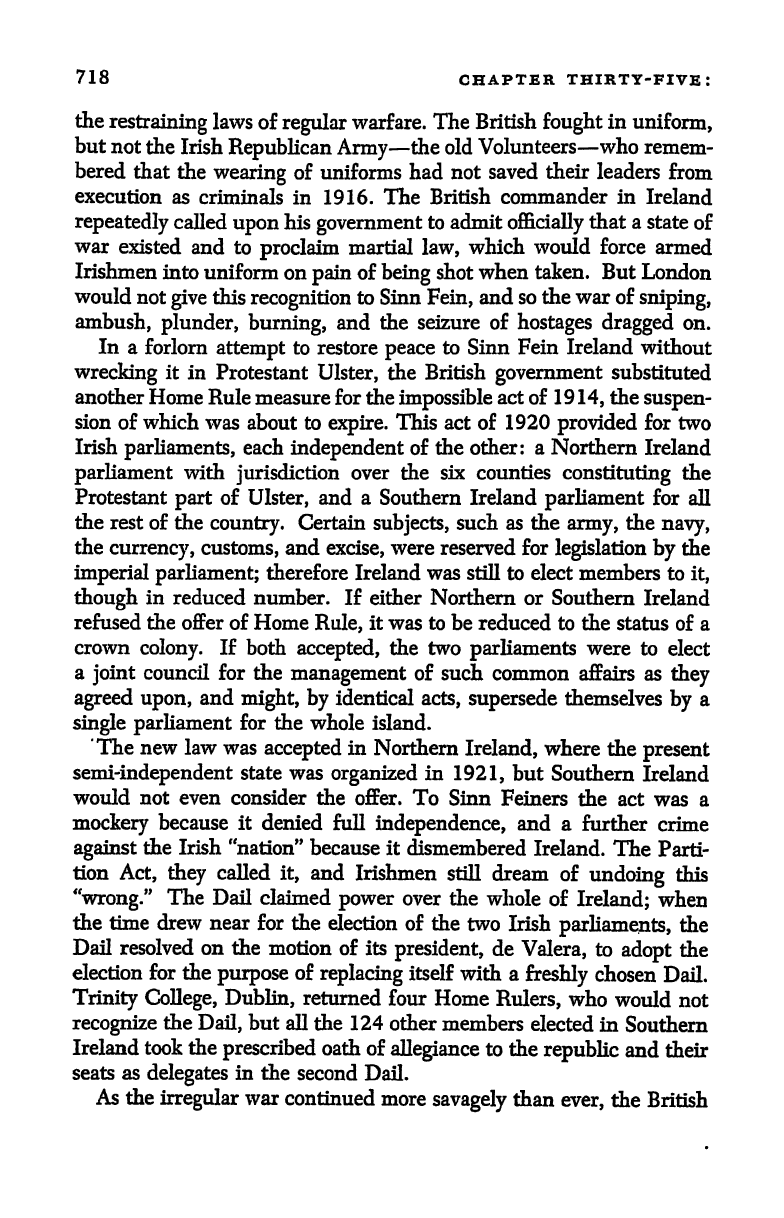
718
CHAPTER
THIRTY-FIVE:
the
restraining
laws of
regular
warfare.
The
British
fought
in
uniform,
but
not
the Irish
Republican Army
the old Volunteers
who
remem-
bered
that
the
wearing
of uniforms had
not
saved
their
leaders
from
execution
as
criminals
in
1916.
The British
commander
in
Ireland
repeatedly
called
upon
his
government
to
admit
officially
that
a
state
of
war
existed
and to
proclaim
martial
law,
which would force
armed
Irishmen into
uniform
on
pain
of
being
shot
when taken. But
London
would
not
give
this
recognition
to Sinn
Fein,
and so
the war of
sniping,
ambush,
plunder,
burning,
and
the
seizure
of
hostages
dragged
on.
In
a
forlorn
attempt
to restore
peace
to
Sinn
Fein Ireland
without
wrecking
it
in Protestant
Ulster,
the
British
government
substituted
another
Home
Rule measure
for
the
impossible
act
of
19
14,
the
suspen-
sion
of which was
about to
expire.
This act of
1920
provided
for
two
Irish
parliaments,
each
independent
of
the other:
a Northern
Ireland
parliament
with
jurisdiction
over
the
six counties
constituting
the
Protestant
part
of
Ulster,
and
a
Southern
Ireland
parliament
for
all
the
rest
of the
country.
Certain
subjects,
such as the
army,
the
navy,
the
currency,
customs,
and
excise,
were
reserved for
legislation
by
the
imperial
parliament;
therefore
Ireland
was
still to elect members
to
it,
though
in
reduced number. If
either
Northern or
Southern
Ireland
refused the offer
of Home
Rule,
it
was
to be
reduced to the
status
of
a
crown
colony.
If
both
accepted,
the
two
parliaments
were
to
elect
a
joint
council for the
management
of such
common
affairs as
they
agreed
upon,
and
might, by
identical
acts,
supersede
themselves
by
a
single
parliament
for
the
whole
island.
'The
new
law
was
accepted
in
Northern
Ireland,
where
the
present
semi-independent
state was
organized
in
1921,
but
Southern
Ireland
would not
even
consider
the offer.
To
Sinn
Feiners
the
act
was a
mockery
because it
denied full
independence,
and a
further
crime
against
the Irish
"nation"
because it
dismembered
Ireland.
The
Parti-
tion
Act,
they
called
it,
and
Irishmen
still
dream
of
undoing
this
"wrong."
The
Bail claimed
power
over the
whole of
Ireland;
when
the time
drew
near
for
the election
of the
two Irish
parliaments,
the
Dail resolved on the
motion of its
president,
de
Valera,
to
adopt
the
election
for the
purpose
of
replacing
itself
with
a
freshly
chosen
Dail.
Trinity
College,
Dublin,
returned four
Home
Rulers,
who
would
not
recognize
the
Dail,
but
all
the
124
other
members
elected in
Southern
Ireland
took
the
prescribed
oath
of
allegiance
to the
republic
and their
seats as
delegates
in
the
second
Dail.
As
the
irregular
war
continued
more
savagely
than
ever,
the British
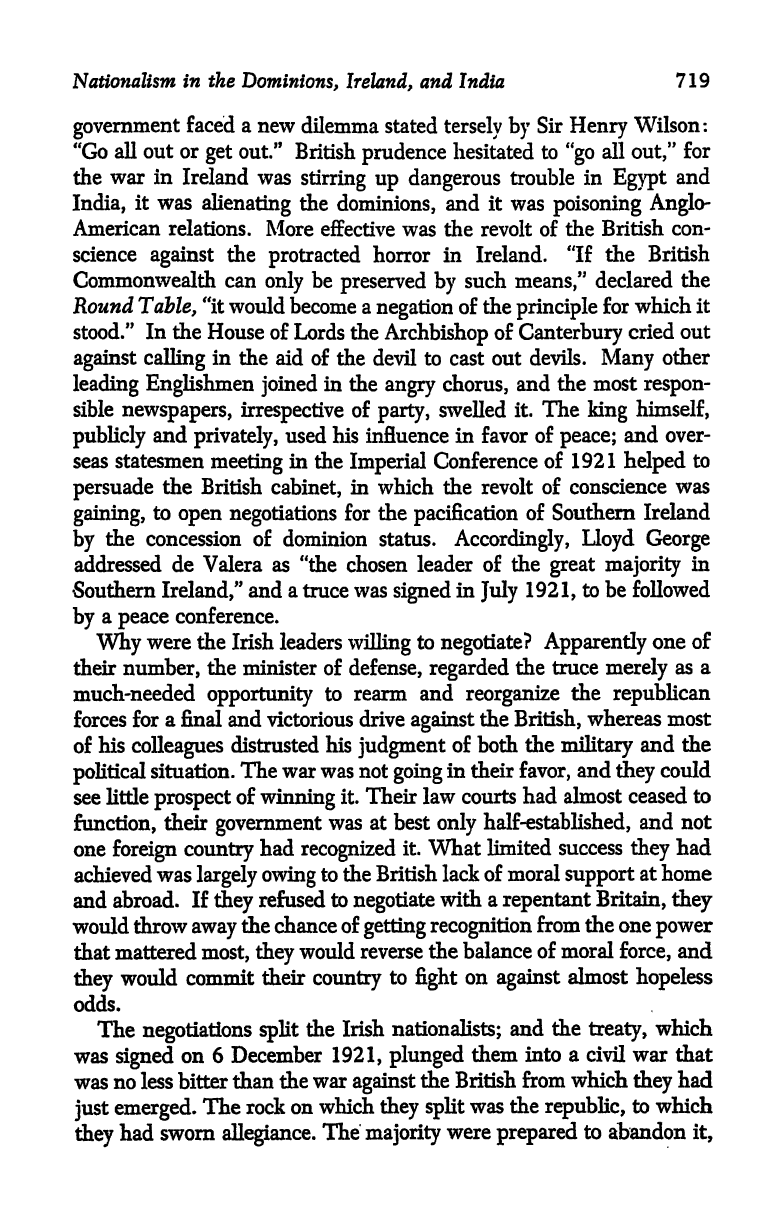
Nationalism
in the
Dominions,
Ireland,
and
India
719
government
faced a
new
dilemma
stated
tersely by
Sir
Henry
Wilson:
"Go
all
out or
get
out."
British
prudence
hesitated
to
"go
all
out,"
for
the
war
in
Ireland
was
stirring
up
dangerous
trouble
in
Egypt
and
India,
it was
alienating
the
dominions,
and
it
was
poisoning
Anglo-
American relations.
More
effective was
the
revolt
of the
British
con-
science
against
the
protracted
horror
in
Ireland.
"If
the
British
Commonwealth
can
only
be
preserved
by
such
means,"
declared
the
Round
Table,
"it
would become a
negation
of the
principle
for
which it
stood."
In
the
House of
Lords
the
Archbishop
of
Canterbury
cried
out
against
calling
in
the
aid
of
the devil to cast
out devils.
Many
other
leading
Englishmen
joined
in the
angry
chorus,
and
the most
respon-
sible
newspapers,
irrespective
of
party,
swelled
it. The
king
himself,
publicly
and
privately,
used his influence in
favor of
peace;
and over-
seas statesmen
meeting
in the
Imperial
Conference
of 1921
helped
to
persuade
the
British
cabinet,
in
which
the revolt of conscience
was
gaining,
to
open
negotiations
for
the
pacification
of
Southern
Ireland
by
the
concession of dominion status.
Accordingly,
Lloyd
George
addressed de Valera as "the
chosen
leader
of
the
great
majority
in
Southern
Ireland,"
and
a
truce
was
signed
in
July
1921,
to be followed
by
a
peace
conference.
Why
were
the
Irish leaders
willing
to
negotiate?
Apparently
one
of
their
number,
the
minister of
defense,
regarded
the truce
merely
as
a
much-needed
opportunity
to
rearm and
reorganize
the
republican
forces
for
a
final and victorious drive
against
the
British,
whereas most
of
his
colleagues
distrusted his
judgment
of both the
military
and
the
political
situation.
The war was not
going
in
their
favor,
and
they
could
see
little
prospect
of
winning
it.
Their
law courts
had
almost ceased
to
function,
their
government
was at best
only
half-established,
and not
one
foreign
country
had
recognized
it.
What limited
success
they
had
achieved
was
largely
owing
to
the British lack
of
moral
support
at home
and
abroad.
If
they
refused
to
negotiate
with
a
repentant
Britain,
they
would
throw
away
the
chance
of
getting
recognition
from the one
power
that mattered
most,
they
would
reverse
the balance
of
moral
force,
and
they
would
commit
their
country
to
fight
on
against
almost
hopeless
odds.
The
negotiations
split
the Irish
nationalists;
and
the
treaty,
which
was
signed
on 6
December
1921,
plunged
them
into a
civil
war that
was
no less bitter
than the
war
against
the British from
which
they
had
just
emerged.
The rock
on
which
they split
was the
republic,
to which
they
had sworn
allegiance.
The
majority
were
prepared
to
abandon
it,
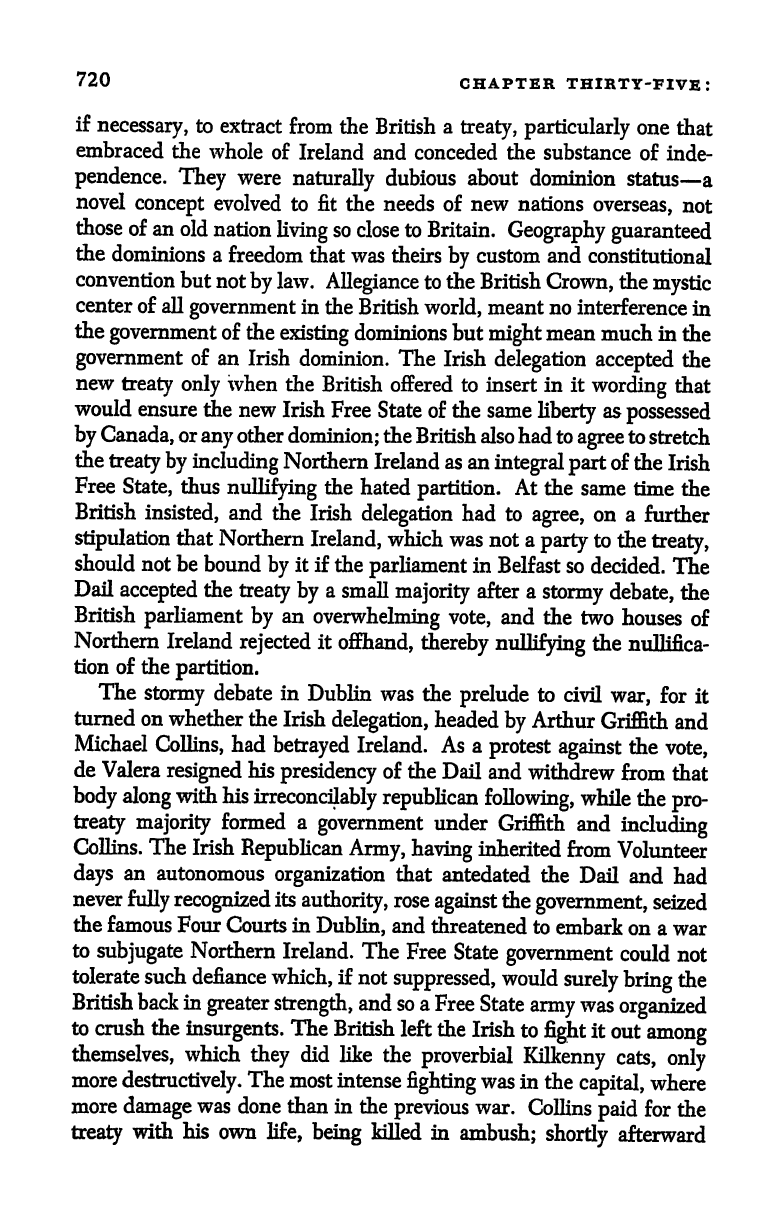
720
CHAPTER
THIRTY-FIVE:
if
necessary,
to
extract
from the
British
a
treaty,
particularly
one
that
embraced the
whole
of
Ireland and conceded the substance
of
inde-
pendence.
They
were
naturally
dubious
about
dominion
status
a
novel
concept
evolved to fit the needs
of
new nations
overseas,
not
those
of an
old
nation
living
so
close to
Britain.
Geography
guaranteed
the
dominions a
freedom that was
theirs
by
custom and
constitutional
convention
but
not
by
law.
Allegiance
to
the British
Crown,
the
mystic
center
of
all
government
in
the
British
world,
meant
no
interference
in
the
government
of
the
existing
dominions
but
might
mean
much
in
the
government
of
an Irish
dominion.
The Irish
delegation accepted
the
new
treaty only
when
the
British offered
to
insert in it
wording
that
would
ensure
tie new Irish
Free
State of the same
liberty
as
possessed
by
Canada,
or
any
other
dominion;
the British
also
had
to
agree
to
stretch
the
treaty
by
including
Northern
Ireland as an
integral part
of the
Irish
Free
State,
thus
nullifying
the
hated
partition.
At
the
same
time
the
British
insisted,
and
the Irish
delegation
had to
agree,
on a
further
stipulation
that
Northern
Ireland,
which was not a
party
to the
treaty,
should not be
bound
by
it
if the
parliament
in
Belfast so
decided.
The
Dail
accepted
the
treaty
by
a
small
majority
after a
stormy
debate,
the
British
parliament
by
an
overwhelming
vote,
and
the
two
houses
of
Northern
Ireland
rejected
it
offhand,
thereby
nullifying
the
nullifica-
tion of the
partition.
The
stormy
debate in
Dublin
was the
prelude
to
civil
war,
for
it
turned
on
whether
the
Irish
delegation,
headed
by
Arthur
Griffith
and
Michael
Collins,
had
betrayed
Ireland. As a
protest
against
the
vote,
de
Valera
resigned
his
presidency
of the
Dail
and
withdrew
from
that
body
along
with his
irreconcilably republican
following,
while
the
pro-
treaty
majority
formed a
government
under
Griffith
and
including
Collins.
The Irish
Republican
Army,
having
inherited
from
Volunteer
days
an
autonomous
organization
that
antedated
the
Dail
and
had
never
fully
recognized
its
authority,
rose
against
die
government,
seized
the
famous Four
Courts in
Dublin,
and
threatened
to
embark on
a war
to
subjugate
Northern
Ireland.
The Free
State
government
could
not
tolerate such
defiance
which,
if not
suppressed,
would
surely
bring
the
British back in
greater
strength,
and so a
Free
State
army
was
organized
to
crush the
insurgents.
The
British
left the
Irish
to
fight
it
out
among
themselves,
which
they
did like
the
proverbial
Kilkenny
cats,
only
more
destructively.
The
most
intense
fighting
was in
the
capital,
where
more
damage
was done than in
the
previous
war.
Collins
paid
for
the
treaty
with his
own
life,
being
killed in
ambush;
shortly
afterward
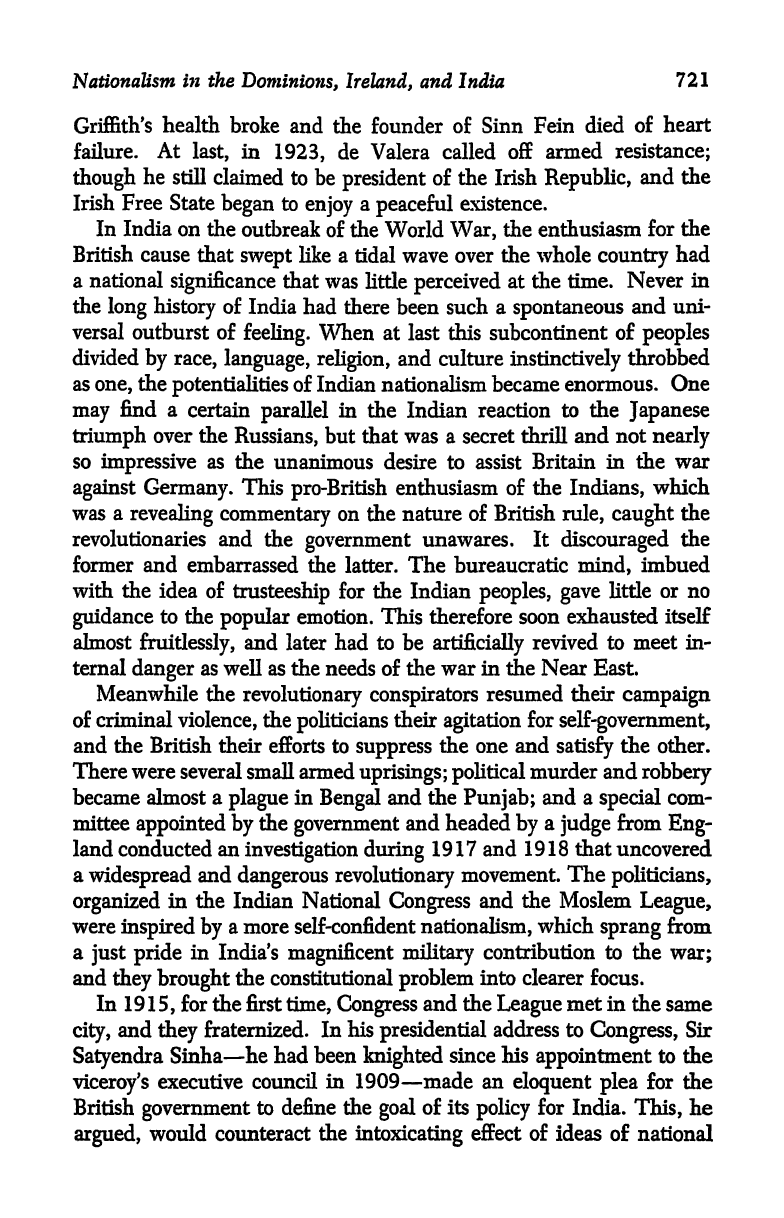
Nationalism
in the
Dominions, Ireland,
and
India
721
Griffith's
health
broke
and
the founder
of
Sinn Fein
died
of
heart
failure.
At
last,
in
1923,
de Valera called
off
armed
resistance;
though
he still
claimed
to
be
president
of
the
Irish
Republic,
and the
Irish
Free
State
began
to
enjoy
a
peaceful
existence.
In India
on
the
outbreak
of
the World
War,
the enthusiasm
for the
British cause
that
swept
like a
tidal wave
over the whole
country
had
a
national
significance
that
was
little
perceived
at the
time. Never
in
the
long
history
of
India
had there
been
such
a
spontaneous
and
uni-
versal
outburst of
feeling.
When at last
this
subcontinent
of
peoples
divided
by
race,
language, religion,
and culture
instinctively
throbbed
as
one,
the
potentialities
of Indian
nationalism
became
enormous.
One
may
find
a
certain
parallel
in the Indian
reaction
to
the
Japanese
triumph
over the
Russians,
but
that
was
a secret
thrill
and
not
nearly
so
impressive
as
the
unanimous desire to
assist
Britain
in the
war
against
Germany.
This
pro-British
enthusiasm
of the
Indians,
which
was
a
revealing commentary
on
the
nature of
British
rule,
caught
the
revolutionaries and
the
government
unawares.
It
discouraged
the
former and
embarrassed the latter. The
bureaucratic
mind,
imbued
with the
idea
of
trusteeship
for the Indian
peoples, gave
littie
or no
guidance
to
the
popular
emotion. This
therefore soon
exhausted
itself
almost
fruitlessly,
and later had
to
be
artificially
revived to
meet in-
ternal
danger
as
well as the
needs of
the
war
in
the Near
East.
Meanwhile
the
revolutionary
conspirators
resumed their
campaign
of
criminal
violence,
the
politicians
their
agitation
for
self-government,
and
the British their
efforts to
suppress
the one
and
satisfy
the other.
There were several
small armed
uprisings; political
murder
and
robbery
became almost
a
plague
in
Bengal
and
the
Punjab;
and
a
special
com-
mittee
appointed
by
the
government
and
headed
by
a
judge
from
Eng-
land conducted
an
investigation during
1917 and
1918 that
uncovered
a
widespread
and
dangerous
revolutionary
movement. The
politicians,
organized
in
the
Indian
National
Congress
and
the Moslem
League,
were
inspired
by
a more self-confident
nationalism,
which
sprang
from
a
just pride
in
India's
magnificent
military
contribution
to the
war;
and
they
brought
tie
constitutional
problem
into clearer
focus.
In
1915,
for
the first
time,
Congress
and the
League
met in
the same
city,
and
they
fraternized. In his
presidential
address to
Congress,
Sir
Satyendra
Sinha
he
had
been
knighted
since
his
appointment
to the
viceroy's
executive
council
in 1909 made
an
eloquent
plea
for the
British
government
to define
the
goal
of its
policy
for
India.
This,
he
argued,
would counteract
the
intoxicating
effect
of ideas
of
national
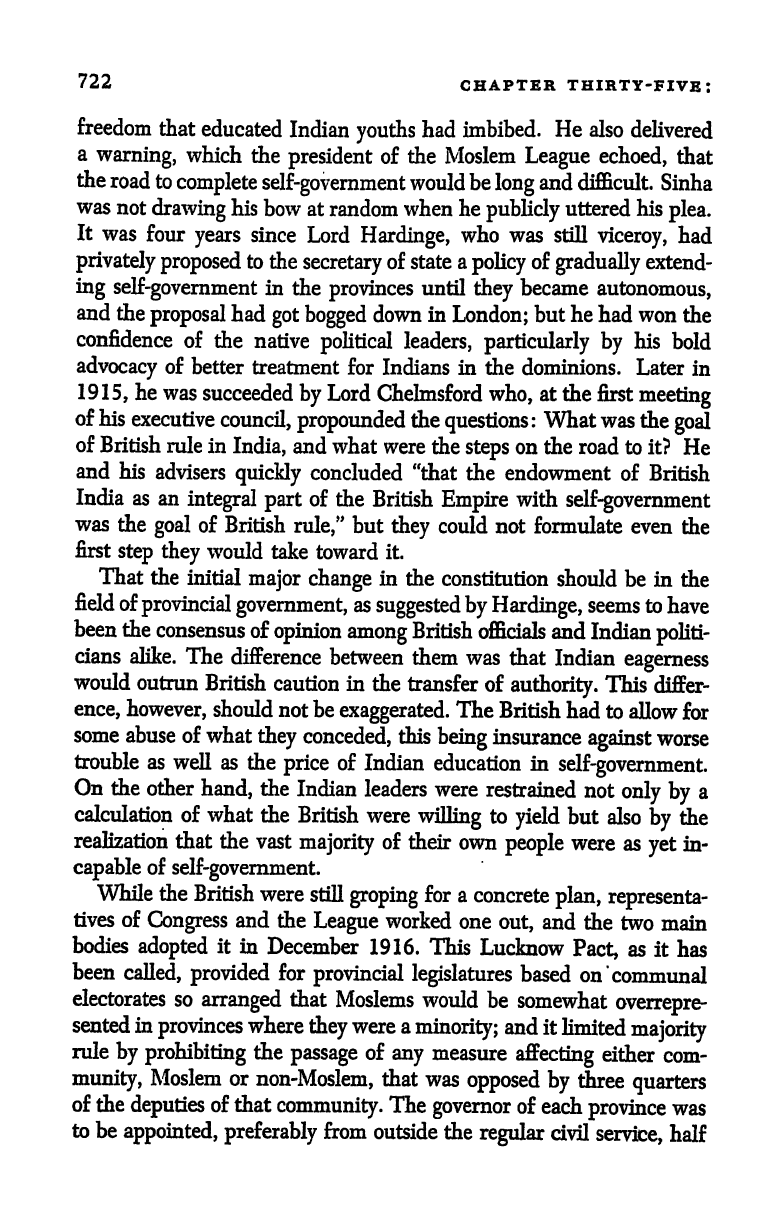
722
CHAPTER
THIRTY-FIVE:
freedom
that
educated
Indian
youths
had
imbibed.
He
also
delivered
a
warning,
which
the
president
of the
Moslem
League
echoed,
that
the
road
to
complete
self-government
would
be
long
and difficult.
Sinha
was
not
drawing
his
bow at
random
when he
publicly
uttered
his
plea.
It
was
four
years
since
Lord
Hardinge,
who was
still
viceroy,
had
privately
proposed
to the
secretary
of state
a
policy
of
gradually
extend-
ing
self-government
in
the
provinces
until
they
became
autonomous,
and
the
proposal
had
got
bogged
down
in
London;
but
he
had won
the
confidence
of
the
native
political
leaders,
particularly by
his
bold
advocacy
of
better
treatment for
Indians in the
dominions. Later
in
1915,
he
was
succeeded
by
Lord
Chelmsford
who,
at
the first
meeting
of
his
executive
council,
propounded
the
questions:
What was
the
goal
of
British
rule in
India,
and what
were
the
steps
on the
road to
it?
He
and
his
advisers
quickly
concluded
"that
the
endowment
of
British
India
as an
integral
part
of the
British
Empire
with
self-government
was
the
goal
of British
rule/'
but
they
could
not
formulate
even
the
first
step
they
would take
toward
it.
That
the
initial
major
change
in
the
constitution
should be in
the
field of
provincial
government,
as
suggested by
Hardinge,
seems to
have
been the
consensus of
opinion
among
British
officials
and Indian
politi-
cians
alike.
The
difference
between them was
that
Indian
eagerness
would
outrun
British
caution in
the transfer
of
authority.
This
differ-
ence,
however,
should
not
be
exaggerated.
The
British
had
to allow
for
some
abuse of
what
they
conceded,
this
being
insurance
against
worse
trouble as
well as
the
price
of
Indian
education in
self-government.
On the
other
hand,
the
Indian
leaders
were
restrained
not
only
by
a
calculation of
what the
British
were
willing
to
yield
but
also
by
the
realization that the
vast
majority
of
their
own
people
were
as
yet
in-
capable
of
self-government.
While
the
British were
still
groping
for
a
concrete
plan,
representa-
tives
of
Congress
and the
League
worked one
out,
and
the
two main
bodies
adopted
it in
December 1916.
This
Lucknow
Pact,
as
it
has
been
called,
provided
for
provincial
legislatures
based on
'communal
electorates
so
arranged
that
Moslems
would be
somewhat
overrepre-
sented in
provinces
where
they
were a
minority;
and
it
limited
majority
rule
by
prohibiting
the
passage
of
any
measure
affecting
either
com-
munity,
Moslem or
non-Moslem,
that
was
opposed
by
three
quarters
of
the
deputies
of that
community.
The
governor
of
each
province
was
to
be
appointed,
preferably
from
outside
the
regular
civil
service,
half
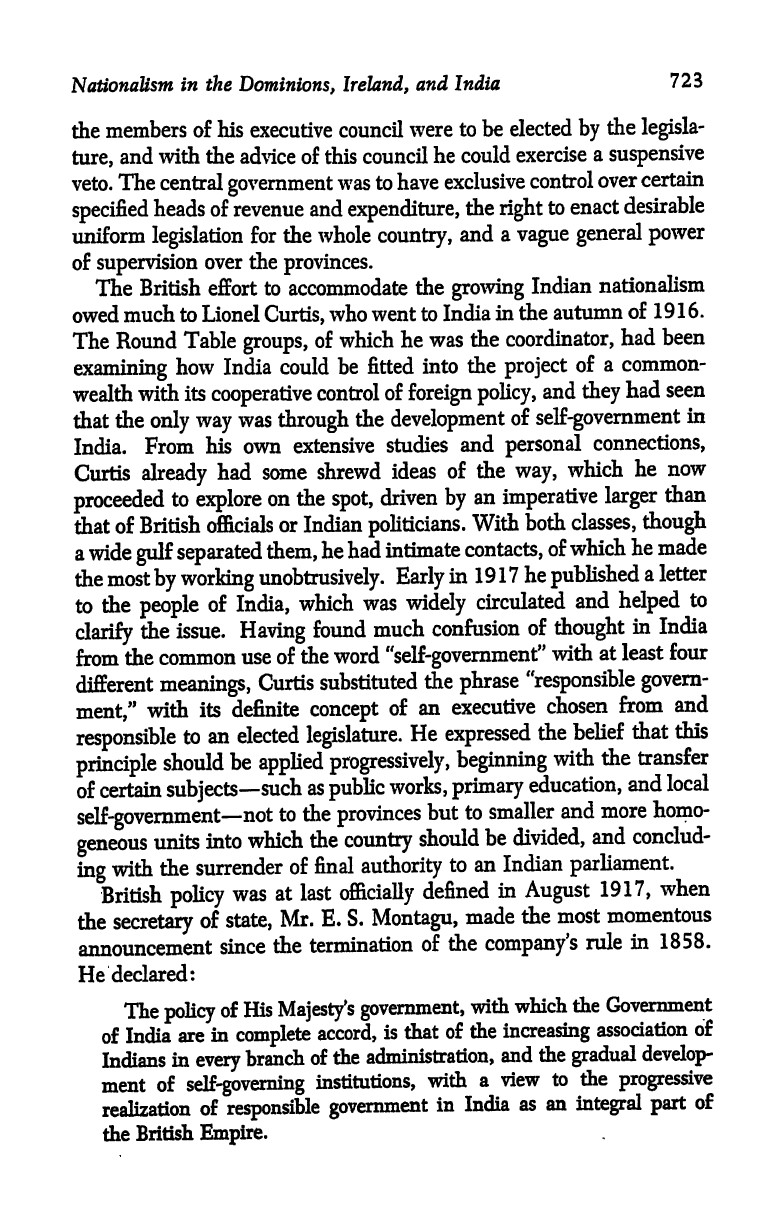
Nationalism
in the
Dominions,
Ireland,
and
India
723
the
members
of
his
executive council
were
to be
elected
by
the
legisla-
ture,
and
with the
advice of this
council
he could
exercise
a
suspensive
veto.
The central
government
was to
have
exclusive
control
over
certain
specified
heads
of
revenue
and
expenditure,
the
right
to
enact
desirable
uniform
legislation
for
the whole
country,
and
a
vague
general
power
of
supervision
over the
provinces.
The
British
effort
to accommodate
the
growing
Indian
nationalism
owed
much
to Lionel
Curtis,
who
went to
India
in
the
autumn
of
1916.
The Round
Table
groups,
of
which
he
was
the
coordinator,
had
been
examining
how
India
could
be
fitted
into
the
project
of
a common-
wealth
with its
cooperative
control
of
foreign
policy,
and
they
had
seen
that
the
only
way
was
through
the
development
of
self-government
in
India.
From
his
own
extensive
studies
and
personal
connections,
Curtis
already
had some
shrewd
ideas
of
the
way,
which
he
now
proceeded
to
explore
on
the
spot,
driven
by
an
imperative
larger
than
that
of
British
officials
or
Indian
politicians.
With
both
classes,
though
a
wide
gulf
separated
them,
he
had
intimate
contacts,
of
which
he
made
the
most
by
working
unobtrusively.
Early
in
19
1 7 he
published
a
letter
to
the
people
of
India,
which
was
widely
circulated
and
helped
to
clarify
the
issue.
Having
found
much
confusion
of
thought
in India
from
the
common
use of
the word
"self-government"
with
at least
four
different
meanings,
Curtis
substituted
the
phrase
"responsible
govern-
ment,"
with
its definite
concept
of
an
executive
chosen
from
and
responsible
to
an
elected
legislature.
He
expressed
the
belief
that
this
principle
should
be
applied
progressively,
beginning
with
the
transfer
of
certain
subjects
such
as
public
work,
primary
education,
and
local
self-government
not
to the
provinces
but
to
smaller
and
more
homo-
geneous
units
into
which the
country
should
be
divided,
and
conclud-
ing
with
the
surrender
of
final
authority
to
an Indian
parliament.
British
policy
was
at last
officially
defined
in
August
1917,
when
the
secretary
of
state,
Mr.
E.
S.
Montagu,
made
the
most
momentous
announcement
since
the
termination
of
the
company's
rule
in
1858.
He
declared:
The
policy
of His
Majesty's
government,
with
which
the
Government
of
India
are
in
complete
accord,
is
that
of
the
increasing
association
of
Indians
in
every
branch
of
the
administration,
and
the
gradual
develop-
ment
of
self-governing
institutions,
with
a
view
to
the
progressive
realization
of
responsible
government
in
India
as
an
integral
part
of
the
British
Empire.
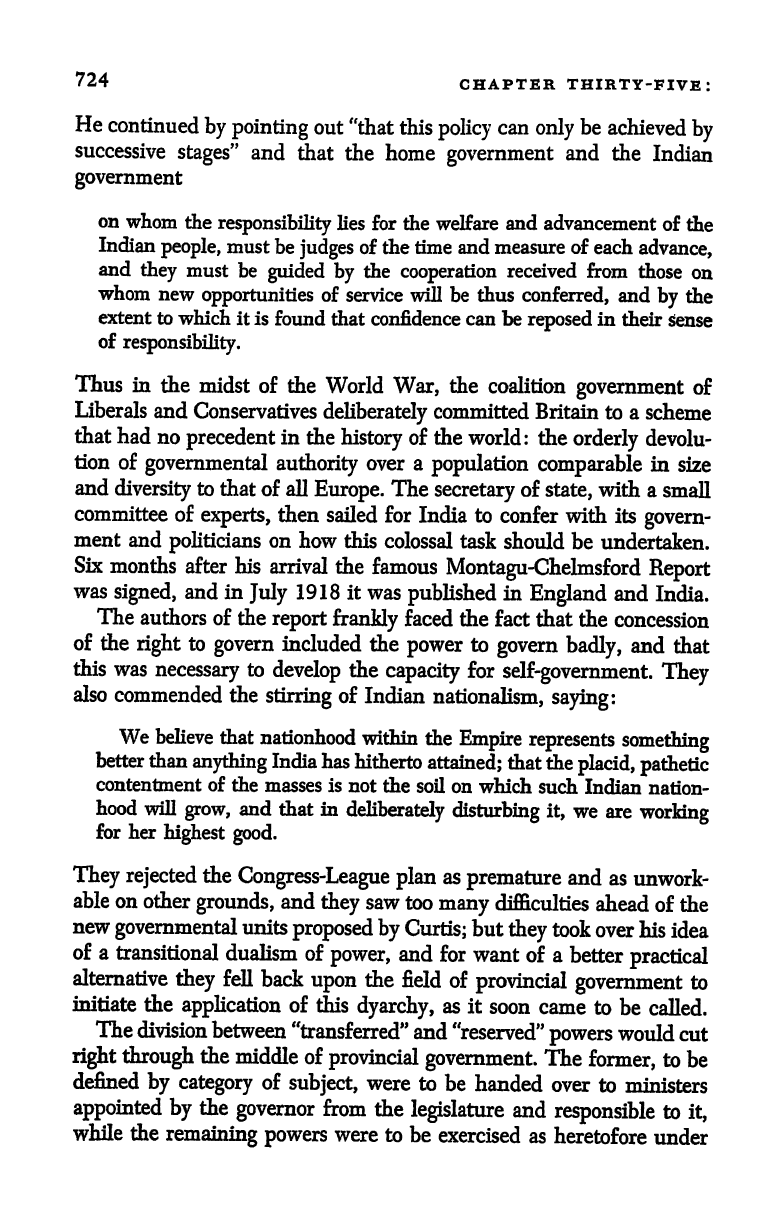
724
CHAPTER
THIRTY-FIVE:
He
continued
by
pointing
out
"that
this
policy
can
only
be
achieved
by
successive
stages"
and
that
the
home
government
and
the
Indian
government
on
whom
the
responsibility
lies for the
welfare
and
advancement
of
the
Indian
people,
must
be
judges
of the time and
measure of
each
advance,
and
they
must be
guided
by
the
cooperation
received
from
those
on
whom
new
opportunities
of service will
be
thus
conferred,
and
by
the
extent
to
which
it is
found that
confidence
can be
reposed
in
their
sense
of
responsibility.
Thus in
the midst
of the
World
War,
the
coalition
government
of
Liberals
and
Conservatives
deliberately
committed Britain
to a
scheme
that
had
no
precedent
in
the
history
of
the
world:
the
orderly
devolu-
tion
of
governmental
authority
over
a
population
comparable
in
size
and
diversity
to
that
of
all
Europe.
The
secretary
of
state,
with a
small
committee
of
experts,
then
sailed
for
India to
confer
with
its
govern-
ment
and
politicians
on
how
this
colossal
task
should be
undertaken.
Six
months
after
his
arrival
the famous
Montagu-Chelmsford
Report
was
signed,
and
in
July
1918 it
was
published
in
England
and
India.
The
authors
of
the
report
frankly
faced the
fact
that the
concession
of
the
right
to
govern
included
the
power
to
govern
badly,
and
that
this
was
necessary
to
develop
the
capacity
for
self-government.
They
also
commended the
stirring
of
Indian
nationalism,
saying:
We
believe that
nationhood within
the
Empire
represents
something
better than
anything
India
has
hitherto
attained;
that the
placid,
pathetic
contentment
of
the masses is
not
the
soil on
which
such
Indian
nation-
hood
will
grow,
and
that in
deliberately
disturbing
it,
we
are
working
for her
highest
good.
They
rejected
the
Congress-League plan
as
premature
and
as
unwork-
able on
other
grounds,
and
they
saw
too
many
difficulties
ahead
of the
new
governmental
units
proposed
by
Curtis;
but
they
took
over
his
idea
of a
transitional
dualism of
power,
and for
want
of a
better
practical
alternative
they
fell
back
upon
the
field
of
provincial
government
to
initiate the
application
of
this
dyarchy,
as
it
soon
came
to be
called.
The
division
between
"transferred"
and
"reserved"
powers
would
cut
right through
the
middle of
provincial
government.
The
former,
to be
defined
by
category
of
subject,
were
to
be
handed over
to
ministers
appointed
by
the
governor
from the
legislature
and
responsible
to
it,
while
the
remaining powers
were
to be
exercised
as
heretofore
under
